牛津译林版七年级下册Unit 5 Amazing things Grammar 课件(共39张PPT)
文档属性
| 名称 | 牛津译林版七年级下册Unit 5 Amazing things Grammar 课件(共39张PPT) |
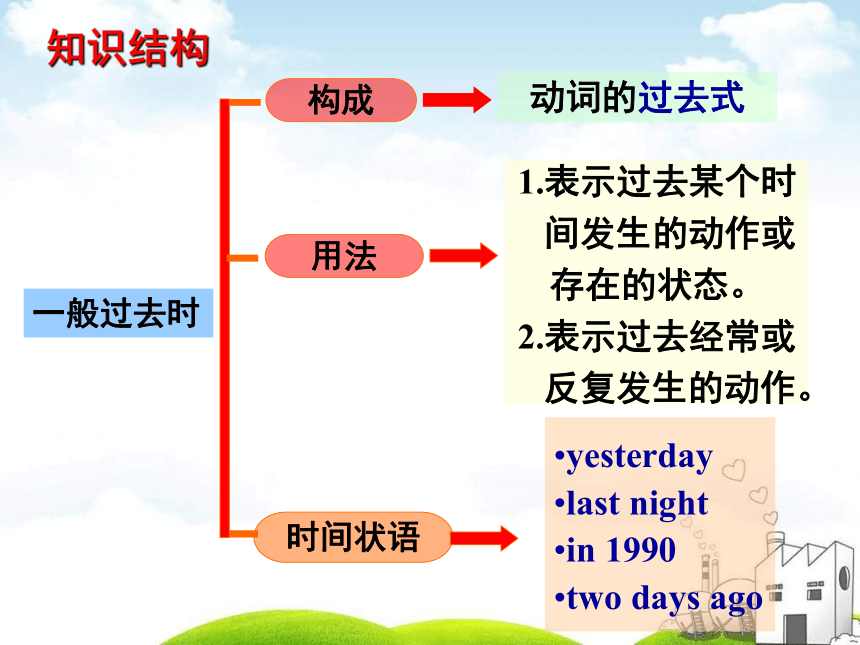
|
|
| 格式 | pptx | ||
| 文件大小 | 2.1MB | ||
| 资源类型 | 教案 | ||
| 版本资源 | 牛津译林版 | ||
| 科目 | 英语 | ||
| 更新时间 | 2023-04-02 08:11:38 | ||
图片预览

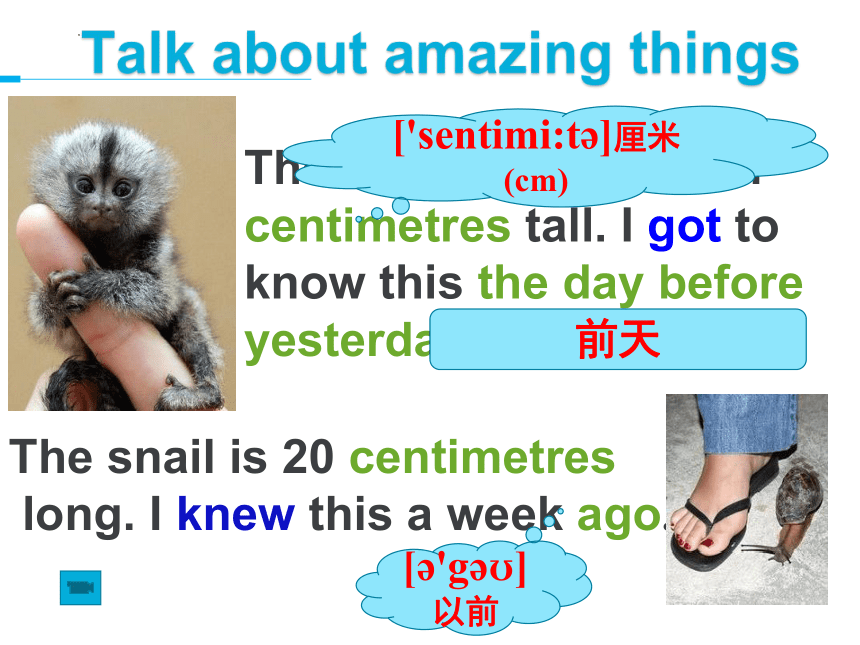
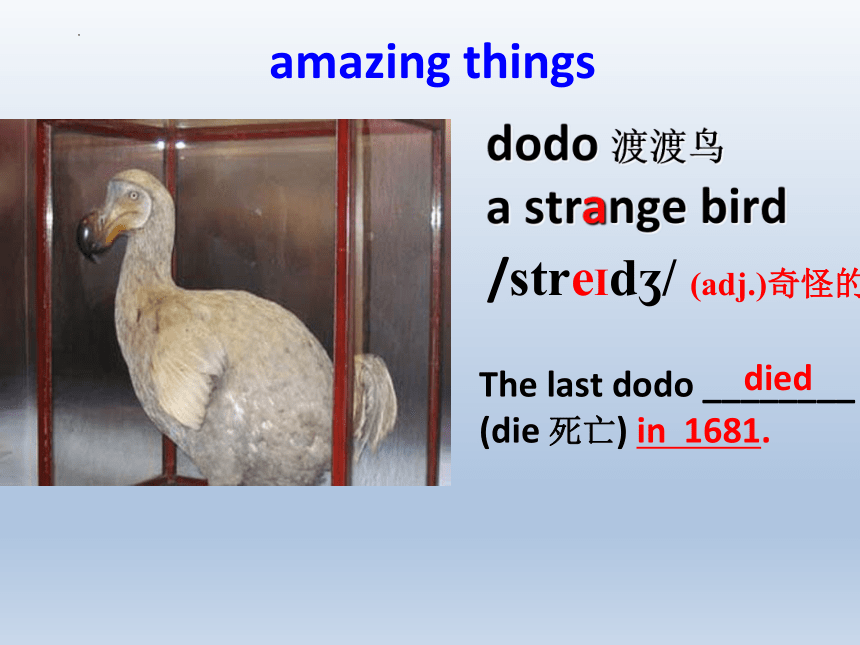
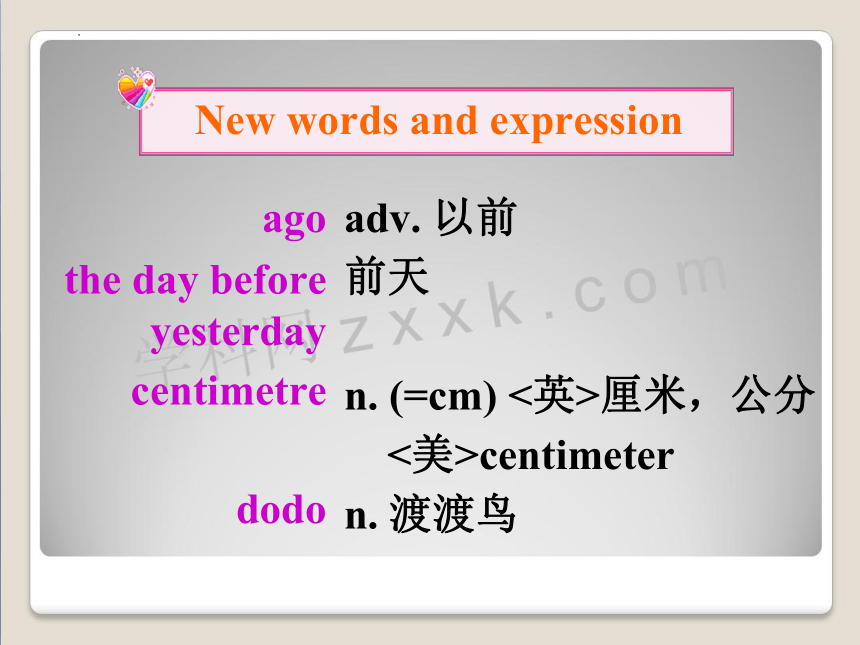
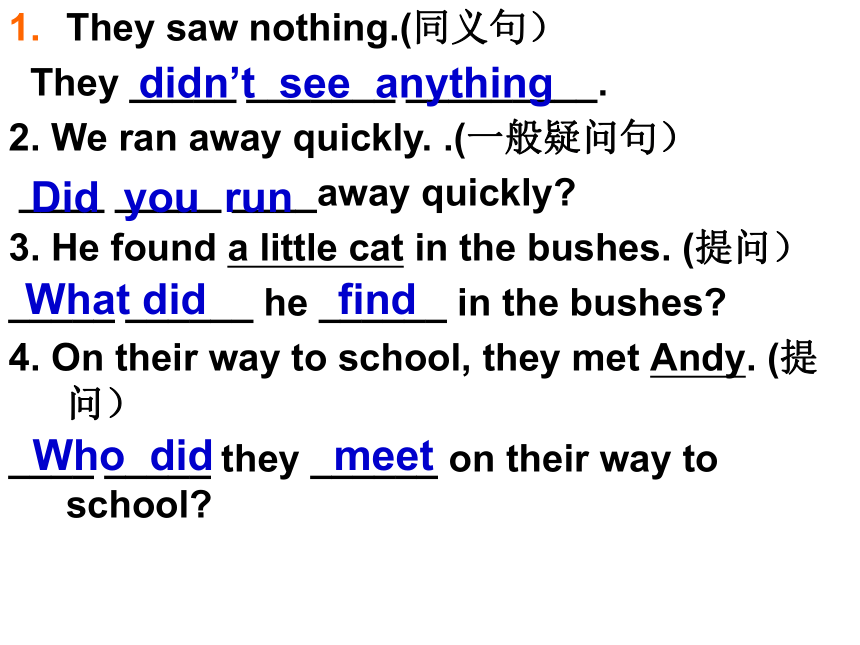
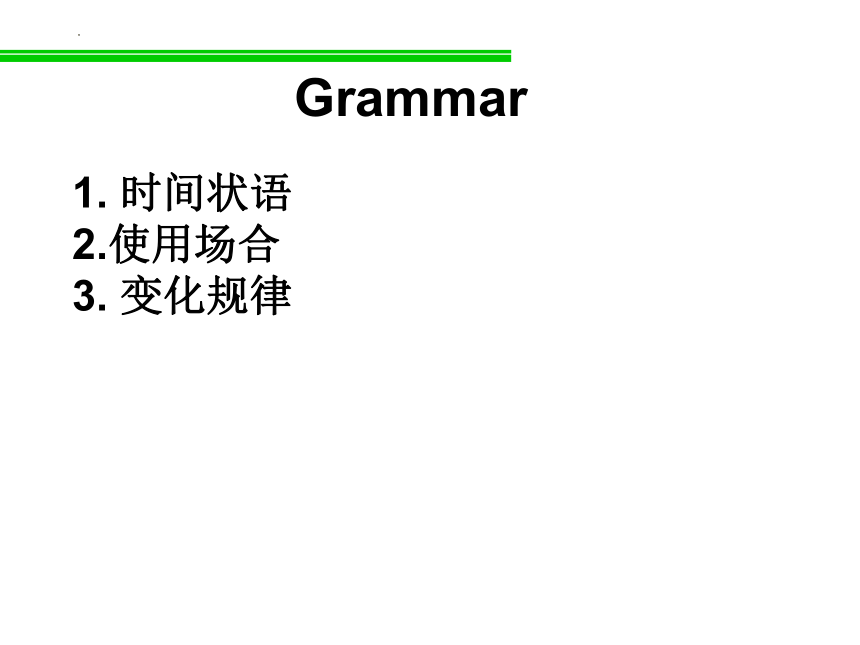
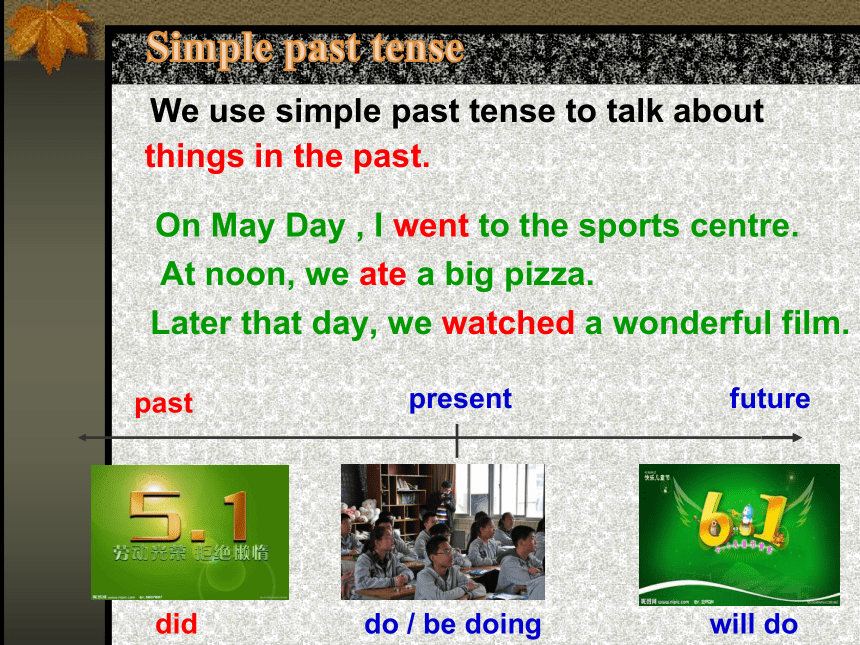
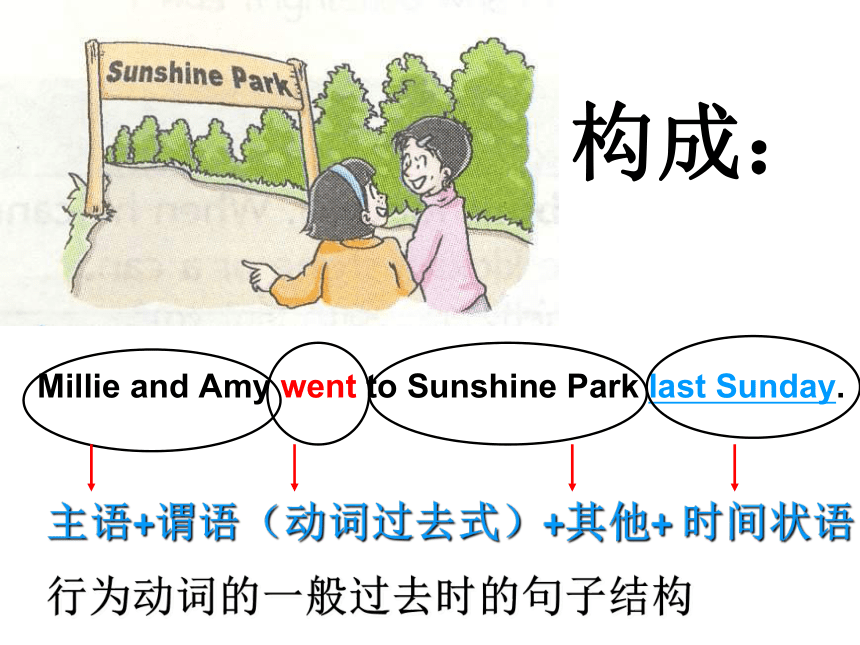
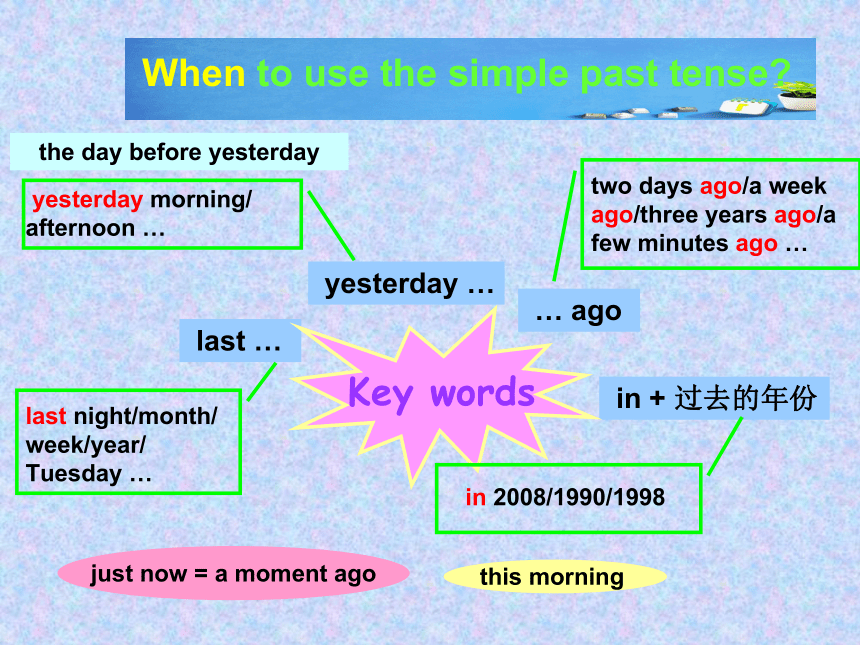

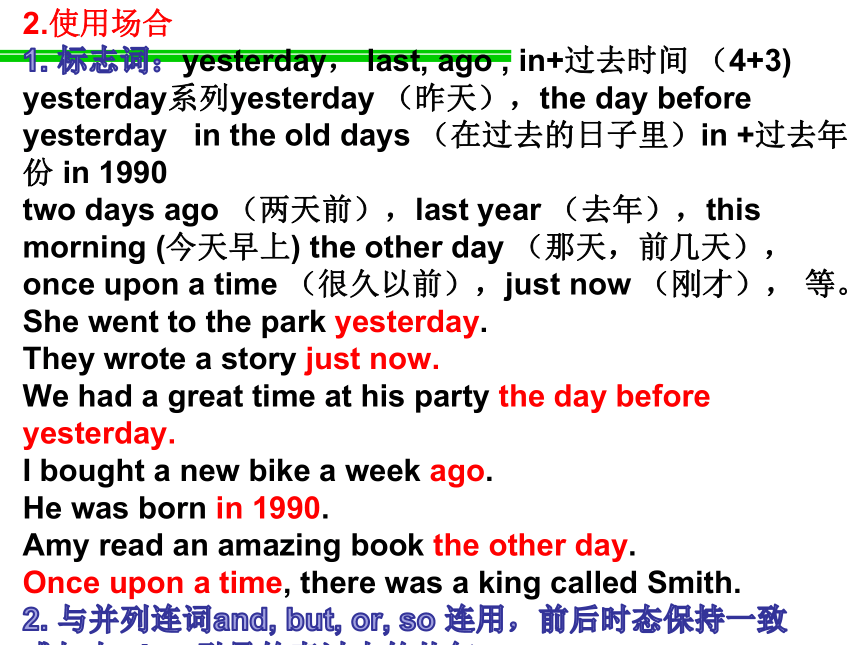
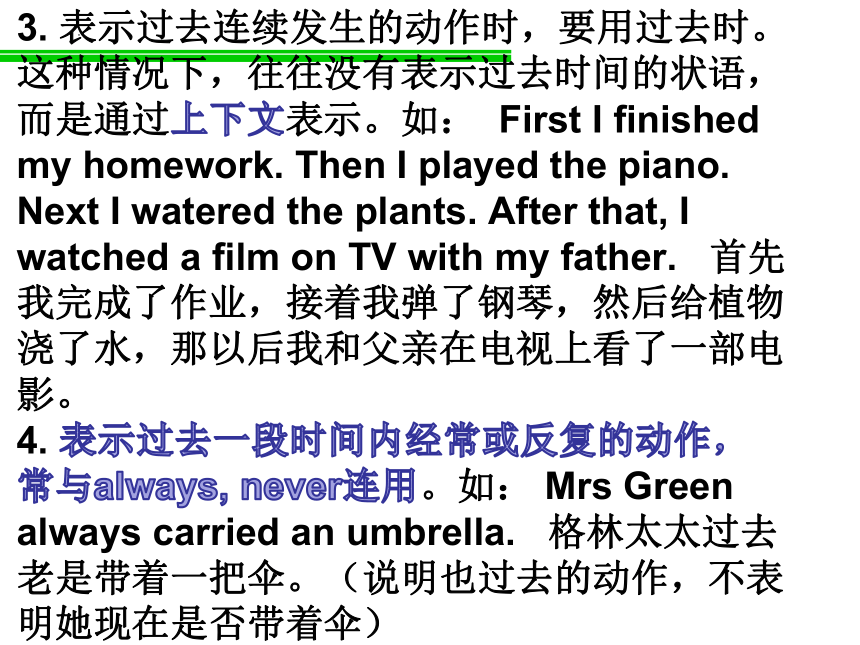
文档简介
(共39张PPT)
构成
用法
时间状语
动词的过去式
1.表示过去某个时
间发生的动作或
存在的状态。
2.表示过去经常或
反复发生的动作。
yesterday
last night
in 1990
two days ago
知识结构
一般过去时
Talk about amazing things
The monkey is only 11 centimetres tall. I got to know this the day before yesterday.
['sentimi:t ]厘米(cm)
前天
The snail is 20 centimetres
long. I knew this a week ago.
[ 'g ]以前
amazing things
The last dodo ________
(die 死亡) in 1681.
dodo 渡渡鸟
a strange bird
died
/streId / (adj.)奇怪的
ago
the day before yesterday
centimetre
dodo
adv. 以前
前天
n. (=cm) <英>厘米,公分
<美>centimeter
n. 渡渡鸟
New words and expression
They saw nothing.(同义句)
They _____ _______ _________.
2. We ran away quickly. .(一般疑问句)
____ _____ ____away quickly
3. He found a little cat in the bushes. (提问)
_____ ______ he ______ in the bushes
4. On their way to school, they met Andy. (提问)
____ _____ they ______ on their way to school
didn’t see anything
Did you run
What did find
Who did meet
Grammar
1. 时间状语
2.使用场合
3. 变化规律
Simple past tense
We use simple past tense to talk about
things in the past.
present
past
future
did
do / be doing
will do
At noon, we ate a big pizza.
Later that day, we watched a wonderful film.
On May Day , I went to the sports centre.
行为动词的一般过去时的句子结构
主语+谓语(动词过去式)+其他+ 时间状语
Millie and Amy went to Sunshine Park last Sunday.
构成:
yesterday …
last …
… ago
yesterday morning/ afternoon …
last night/month/ week/year/ Tuesday …
two days ago/a week ago/three years ago/a few minutes ago …
just now = a moment ago
in + 过去的年份
in 2008/1990/1998
this morning
the day before yesterday
When to use the simple past tense
Key words
一般过去时的典型标志:
last Tuesday/week/month…
yesterday (morning/afternoon…)
this morning
…ago (2 days ago/5 weeks ago…)
the day before yesterday
前天
in +过去的年份 (in1860/ in 1978 …)
just now = a moment ago
the other day
刚才
今天上午
几天以前=a few days ago
at/in/on + 表示过去时间的短语
When I came in
(其余this都是将来时)
2.使用场合
1. 标志词:yesterday, last, ago , in+过去时间 (4+3)
yesterday系列yesterday (昨天),the day before yesterday in the old days (在过去的日子里)in +过去年份 in 1990
two days ago (两天前),last year (去年),this morning (今天早上) the other day (那天,前几天),once upon a time (很久以前),just now (刚才), 等。
She went to the park yesterday.
They wrote a story just now.
We had a great time at his party the day before yesterday.
I bought a new bike a week ago.
He was born in 1990.
Amy read an amazing book the other day.
Once upon a time, there was a king called Smith.
2. 与并列连词and, but, or, so 连用,前后时态保持一致
或与由when引导的表过去的从句。
3. 表示过去连续发生的动作时,要用过去时。这种情况下,往往没有表示过去时间的状语,而是通过上下文表示。如: First I finished my homework. Then I played the piano. Next I watered the plants. After that, I watched a film on TV with my father. 首先我完成了作业,接着我弹了钢琴,然后给植物浇了水,那以后我和父亲在电视上看了一部电影。
4. 表示过去一段时间内经常或反复的动作,常与always, never连用。如: Mrs Green always carried an umbrella. 格林太太过去老是带着一把伞。(说明也过去的动作,不表明她现在是否带着伞)
He _______ (eat) some bread and ______ (drink) some milk this morning.
2. Tom _______ (begin) to learn English half a year ago.
3. Last week we ________ (pick) many apples on the farm.
4. What _____________ (happen) to you just now
5. Everyone ________ (have) fun at Jim’s birthday party yesterday.
6. There _______ (be) some hospitals in my hometown in 1940.
7. I __________ (watch) a wonderful fashion show on TV a moment ago.
8. I __________ (write) a diary about the trip to Suzhou the day before yesterday.
ate
drank
began
picked
had
were
watched
wrote
happened
Have a try
play computer games
watch TV
cook
played
watched
cooked
last week
move
moved
use
used
just now
cry
cried
carry
carried
study
studied
yesterday
chat
chatted
stop
stopped
shop
shopped
two weeks ago
(一) be动词的一般过去时
am was
is was
are were
(二) 助动词的一般过去时
do did
(三) 行为动词/实意动词的一般过去时
1 Most verbs 一般谓语动词后 +ed walk—walked
2 Verbs ending in -e 以e结尾的动词 +d live—lived
3 Verbs ending in a consonant +y 以辅音字母+y结尾的动词 -y + ied cry—cried
4 Short verbs ending in a vowel + a consonant 以一个元音字母+一个辅音字母结尾的短动词 double the consonant + ed 双写末尾的辅音字母+ed stop—stopped
规则动词过去式的构成方法
以元音字母+y结尾的动词
按第一条规则,即:+ed, —stayed
want— search —
talk — listen —
like — wonder—
ask — reply —
try — worry —
happen— stop —
wanted
talked
liked
worried
tried
stopped
写出下列动词的过去式。
searched
listened
asked
wondered
replied
happened
how to pronounce -ed ending(P65)
Listen to the tape and try to find out the rules.
/t/ /d/ / d/
danced played hated
helped lived needed
talked answered visited
shopped carried shouted
/t/ : 动词结尾发清辅音
/d/: 动词结尾发浊辅音或元音
/ d/: 动词结尾发/t/ 或/d/
/s/
/p/
/k/
/p/
/e /
/v/
/r/
/ /
/t/
/t/
/d/
/t/
[p], [k] , [θ], [s] , [ts]
[∫], [t∫] , [tr] , [f] , [h]
How do you pronounce the endings of
These words Listen and write /t/ , /d/ or
/Id/ in the blanks.
listen ______
like ______
want ______
hope ______
5. start ______
6. chat ______
/d/
/t/
/Id/
/t/
/Id/
/Id/
7. finish ______
8. pass ______
9. stop ______
10. raise ______
11. walk ______
12. turn ______
/t/
/t/
/t/
/d/
/t/
/d/
ed
d
ted
ed
d
ed
ed
ed
ped
d
ed
ed
Millie: Sandy, you're late. The museum closed just a
minute ago.
Sandy: Sorry. My grandma visited us this afternoon, so I
stayed at home and talked to her.
Millie: That's OK.
Sandy: I hope you enjoyed your day. What did you do
Millie: We watched a short film. It showed a lot of
amazing things in the world.
Kitty: Then we played some amazing games. It was fun!
We're going to come here again next weekend.
Sandy: Let me come with you then!
continuation
Task 1 Listen and read. Notice the pronunciation of the –ed ending(注意动词-ed结尾的发音)
1 No change 与原形一致, 保持不变 cost-cost put-put
2 Change the vowel 元音有变化 write-wrote know-knew
3 Change the consonant 辅音有变化 make-made spend-spent
4 Change the vowel(s) and the consonant(s) 元音、辅音均有变化 leave-left teach-taught
5 Others 其他变化 is-was
am-was
are-were
have-had
不规则动词过去式的构成方法
Read:
am/is — hear —
are — find —
see — run —
go — say —
sit — stand —
leave — tell —
meet — take —
was
were
saw
went
sat
left
met
heard
found
ran
said
stood
told
took
start ______
love _________
play ______
plan ______
9. leave _____
10. tell _____
11. stand _____
12. bring ______
5. reply _____
6. say ________
7. meet _____
8. hear ______
started
played
loved
planned
said
replied
left
met
stood
told
heard
brought
PRACTISE
Finish Part A on page 62.
This morning, we _____ (go) to the Fun World Museum. When we ____ (get) to the museum, there _____ (be) a lot of people there. We _____ (spend) three hours in the museum. I ____ (take) a lot of photos. Some of us _______ (buy) cards of the animals there. We _____ (come) back to school at 1 p.m. We ____ (have) a great time!
went
were
spent
took
bought
came
had
got
Finish Part B on page 62.
Millie: We _____ (go) to the Fun World Museum
the day before yesterday, Daniel. It ____
(be) so interesting!
Daniel: Really Tell me all about it.
Millie: OK. We ____ (see) a small monkey, only
11 centimetres tall.
Daniel: That’s amazing! What else
Millie: We also _____ (learn) about some
strange birds like dodos. They _____ (live)
on the earth a long time ago.
Daniel: That’s cool!
went
saw
was
learnt
lived
Finish Part C on page 62.
谓语动词为be动词 的一般过去时
(1)肯定句:
主语+was/were+其他.
They were at home yesterday.
(2) 否定句:
主语+wasn’t/weren’t+其他.
They ___________ at home yesterday.
weren’t
(3)一般疑问句:
Was/Were+主语+其他
回答:
Yes,主语+ was/were. /No, 主语+ wasn’t/weren’t.
________ they at home yesterday Yes,___________. / No, ____________.
were
they were they weren’t
一般过去时的句式结构:谓语动词为实意动词的一般过去时
1.肯定句:主语+谓语动词过去式……
2.否定句:
主语 + didn’t +谓语动原形 ……
3.一般疑问句:
--Did +主语+谓语动原形……
--Yes, 代词+did. / No, 代词+ didn’t.
4. 特殊疑问句:特殊疑问词 + did + 主语+ 动原?
1. Lucy did her homework at home.(改否定句)
Lucy ______ ___ her homework at home.
2. He found some meat in the fridge. (变一般疑问句)
____ he ____ ____ meat in the fridge
3. She stayed there for a week. (对划线部分提问)
____ ____ ___ she ____ there
4. There was some orange in the cup. (变一般疑问句)
_____ there ___ orange in the cup
didn’t do
Did find any
How long did stay
Was any
改写句子。
二.用所给动词的适当形式填空:
1.Tom________(come) to Paris two months ago .
2.I really_______(like) this red blouse last term (学期).
3.He _____________ (not come) to school late this
morning.
4.She _________ (wear) a red coat yesterday.
5.My uncle ______( be) born in a small city .
6.He ______(live) in a flat in Beijing in 1987.
7.She ___________( buy ) a book last week .
8.I ________(finish) my homework twenty minutes ago .
came
liked
didn’t come
wore
was
lived
bought
finished
. It’s 7:00 now. The students _______________(read) English in the classroom .
.Don’t shout ! The baby _____________ (sleep).
.--- ______ they _______ ( live) here last year
--- Yes, they did.
12 .He ________ (want) to be a teacher when he was 13 years old.
.He ________ (wait) for you for a long time yesterday .
.He often __________( wait ) for you in your office .
are reading
is sleeping
Did live
wanted
waited
waits
There _______(not be) any drinks in the fridge now .
2 ______ Millie ______( ask) Grandma about the dress last Monday
3 Sandy ___________(wear) a red and white T-shirt today .
4 At weekends , I like___________( listen ) to English songs and __________( shop).
5 Daniel _______( go ) to the Computer Club every Tuesday afternoon .
aren’t
Did ask
is wearing
listening
shopping
goes
1. I _______ (be) born in 2000.
2. We ________ (take) a lot of photos last month.
3. Tom ______ (put) the books in the bag and left the classroom.
4. I _______ (see) a UFO in the sky last night.
5. We _______ (be) at home yesterday.
6. The students _______ (have) a Chinese lesson just now.
7. We _______ (eat) some baozi for breakfast this morning.
8. She _________ (buy) a book the day before yesterday.
9. Our classmates _________ (visit) Huangqiao Park last weekend.
10. He ______ in Shanghai three years ago, but now he ______
in Taixing. (live)
用所给词的适当形式填空
was
took
put
saw
were
had
ate
bought
visited
lived
lives
6.Daniel always ______( fly) kites after school .
Now he ______________( not fly) kites.
He ___________( eat) an apple.
7.Our class ______( give) a fashion show two days ago .
8.She ________( play) badminton on the
playground a moment ago.
9.My mother often ________( watch) TV in the evening . But last night she ______________( not watch)TV .
She _______( write) to her friend.
10.Look, the boy __________( help) the old man
___________( carry) the water.
flies
isn’t flying
is eating
gave
played
watches
didn’t watch
wrote
is helping
(to) carry
Class exercises
一.选择题
( )1. Did he ____ to sleep late last night
A. went B. go C. goes D. going
( )2. My father _____ ill yesterday.
A. isn't B. aren't
C. wasn't D. weren’t
( )3. What did you do ____ last weekend
A. in B. / C. for D. under
( )4. I _____ English yesterday evening.
A. study B. studied
C. studied D. studies
B
C
B
B
巧记动词过去时态
动词一般过去时,表示过去发生的事;
be用was或用were, have, has变had;
谓语动词过去式,过去时间做标志;
一般动词加-ed,若是特殊得硬记。
否定句很简单,主语之后didn’t添;
疑问句也不难,did放在主语前;
如果谓语之前有did,谓语动词需还原;
动词若是was, were, 否定就把not添。
构成
用法
时间状语
动词的过去式
1.表示过去某个时
间发生的动作或
存在的状态。
2.表示过去经常或
反复发生的动作。
yesterday
last night
in 1990
two days ago
知识结构
一般过去时
Talk about amazing things
The monkey is only 11 centimetres tall. I got to know this the day before yesterday.
['sentimi:t ]厘米(cm)
前天
The snail is 20 centimetres
long. I knew this a week ago.
[ 'g ]以前
amazing things
The last dodo ________
(die 死亡) in 1681.
dodo 渡渡鸟
a strange bird
died
/streId / (adj.)奇怪的
ago
the day before yesterday
centimetre
dodo
adv. 以前
前天
n. (=cm) <英>厘米,公分
<美>centimeter
n. 渡渡鸟
New words and expression
They saw nothing.(同义句)
They _____ _______ _________.
2. We ran away quickly. .(一般疑问句)
____ _____ ____away quickly
3. He found a little cat in the bushes. (提问)
_____ ______ he ______ in the bushes
4. On their way to school, they met Andy. (提问)
____ _____ they ______ on their way to school
didn’t see anything
Did you run
What did find
Who did meet
Grammar
1. 时间状语
2.使用场合
3. 变化规律
Simple past tense
We use simple past tense to talk about
things in the past.
present
past
future
did
do / be doing
will do
At noon, we ate a big pizza.
Later that day, we watched a wonderful film.
On May Day , I went to the sports centre.
行为动词的一般过去时的句子结构
主语+谓语(动词过去式)+其他+ 时间状语
Millie and Amy went to Sunshine Park last Sunday.
构成:
yesterday …
last …
… ago
yesterday morning/ afternoon …
last night/month/ week/year/ Tuesday …
two days ago/a week ago/three years ago/a few minutes ago …
just now = a moment ago
in + 过去的年份
in 2008/1990/1998
this morning
the day before yesterday
When to use the simple past tense
Key words
一般过去时的典型标志:
last Tuesday/week/month…
yesterday (morning/afternoon…)
this morning
…ago (2 days ago/5 weeks ago…)
the day before yesterday
前天
in +过去的年份 (in1860/ in 1978 …)
just now = a moment ago
the other day
刚才
今天上午
几天以前=a few days ago
at/in/on + 表示过去时间的短语
When I came in
(其余this都是将来时)
2.使用场合
1. 标志词:yesterday, last, ago , in+过去时间 (4+3)
yesterday系列yesterday (昨天),the day before yesterday in the old days (在过去的日子里)in +过去年份 in 1990
two days ago (两天前),last year (去年),this morning (今天早上) the other day (那天,前几天),once upon a time (很久以前),just now (刚才), 等。
She went to the park yesterday.
They wrote a story just now.
We had a great time at his party the day before yesterday.
I bought a new bike a week ago.
He was born in 1990.
Amy read an amazing book the other day.
Once upon a time, there was a king called Smith.
2. 与并列连词and, but, or, so 连用,前后时态保持一致
或与由when引导的表过去的从句。
3. 表示过去连续发生的动作时,要用过去时。这种情况下,往往没有表示过去时间的状语,而是通过上下文表示。如: First I finished my homework. Then I played the piano. Next I watered the plants. After that, I watched a film on TV with my father. 首先我完成了作业,接着我弹了钢琴,然后给植物浇了水,那以后我和父亲在电视上看了一部电影。
4. 表示过去一段时间内经常或反复的动作,常与always, never连用。如: Mrs Green always carried an umbrella. 格林太太过去老是带着一把伞。(说明也过去的动作,不表明她现在是否带着伞)
He _______ (eat) some bread and ______ (drink) some milk this morning.
2. Tom _______ (begin) to learn English half a year ago.
3. Last week we ________ (pick) many apples on the farm.
4. What _____________ (happen) to you just now
5. Everyone ________ (have) fun at Jim’s birthday party yesterday.
6. There _______ (be) some hospitals in my hometown in 1940.
7. I __________ (watch) a wonderful fashion show on TV a moment ago.
8. I __________ (write) a diary about the trip to Suzhou the day before yesterday.
ate
drank
began
picked
had
were
watched
wrote
happened
Have a try
play computer games
watch TV
cook
played
watched
cooked
last week
move
moved
use
used
just now
cry
cried
carry
carried
study
studied
yesterday
chat
chatted
stop
stopped
shop
shopped
two weeks ago
(一) be动词的一般过去时
am was
is was
are were
(二) 助动词的一般过去时
do did
(三) 行为动词/实意动词的一般过去时
1 Most verbs 一般谓语动词后 +ed walk—walked
2 Verbs ending in -e 以e结尾的动词 +d live—lived
3 Verbs ending in a consonant +y 以辅音字母+y结尾的动词 -y + ied cry—cried
4 Short verbs ending in a vowel + a consonant 以一个元音字母+一个辅音字母结尾的短动词 double the consonant + ed 双写末尾的辅音字母+ed stop—stopped
规则动词过去式的构成方法
以元音字母+y结尾的动词
按第一条规则,即:+ed, —stayed
want— search —
talk — listen —
like — wonder—
ask — reply —
try — worry —
happen— stop —
wanted
talked
liked
worried
tried
stopped
写出下列动词的过去式。
searched
listened
asked
wondered
replied
happened
how to pronounce -ed ending(P65)
Listen to the tape and try to find out the rules.
/t/ /d/ / d/
danced played hated
helped lived needed
talked answered visited
shopped carried shouted
/t/ : 动词结尾发清辅音
/d/: 动词结尾发浊辅音或元音
/ d/: 动词结尾发/t/ 或/d/
/s/
/p/
/k/
/p/
/e /
/v/
/r/
/ /
/t/
/t/
/d/
/t/
[p], [k] , [θ], [s] , [ts]
[∫], [t∫] , [tr] , [f] , [h]
How do you pronounce the endings of
These words Listen and write /t/ , /d/ or
/Id/ in the blanks.
listen ______
like ______
want ______
hope ______
5. start ______
6. chat ______
/d/
/t/
/Id/
/t/
/Id/
/Id/
7. finish ______
8. pass ______
9. stop ______
10. raise ______
11. walk ______
12. turn ______
/t/
/t/
/t/
/d/
/t/
/d/
ed
d
ted
ed
d
ed
ed
ed
ped
d
ed
ed
Millie: Sandy, you're late. The museum closed just a
minute ago.
Sandy: Sorry. My grandma visited us this afternoon, so I
stayed at home and talked to her.
Millie: That's OK.
Sandy: I hope you enjoyed your day. What did you do
Millie: We watched a short film. It showed a lot of
amazing things in the world.
Kitty: Then we played some amazing games. It was fun!
We're going to come here again next weekend.
Sandy: Let me come with you then!
continuation
Task 1 Listen and read. Notice the pronunciation of the –ed ending(注意动词-ed结尾的发音)
1 No change 与原形一致, 保持不变 cost-cost put-put
2 Change the vowel 元音有变化 write-wrote know-knew
3 Change the consonant 辅音有变化 make-made spend-spent
4 Change the vowel(s) and the consonant(s) 元音、辅音均有变化 leave-left teach-taught
5 Others 其他变化 is-was
am-was
are-were
have-had
不规则动词过去式的构成方法
Read:
am/is — hear —
are — find —
see — run —
go — say —
sit — stand —
leave — tell —
meet — take —
was
were
saw
went
sat
left
met
heard
found
ran
said
stood
told
took
start ______
love _________
play ______
plan ______
9. leave _____
10. tell _____
11. stand _____
12. bring ______
5. reply _____
6. say ________
7. meet _____
8. hear ______
started
played
loved
planned
said
replied
left
met
stood
told
heard
brought
PRACTISE
Finish Part A on page 62.
This morning, we _____ (go) to the Fun World Museum. When we ____ (get) to the museum, there _____ (be) a lot of people there. We _____ (spend) three hours in the museum. I ____ (take) a lot of photos. Some of us _______ (buy) cards of the animals there. We _____ (come) back to school at 1 p.m. We ____ (have) a great time!
went
were
spent
took
bought
came
had
got
Finish Part B on page 62.
Millie: We _____ (go) to the Fun World Museum
the day before yesterday, Daniel. It ____
(be) so interesting!
Daniel: Really Tell me all about it.
Millie: OK. We ____ (see) a small monkey, only
11 centimetres tall.
Daniel: That’s amazing! What else
Millie: We also _____ (learn) about some
strange birds like dodos. They _____ (live)
on the earth a long time ago.
Daniel: That’s cool!
went
saw
was
learnt
lived
Finish Part C on page 62.
谓语动词为be动词 的一般过去时
(1)肯定句:
主语+was/were+其他.
They were at home yesterday.
(2) 否定句:
主语+wasn’t/weren’t+其他.
They ___________ at home yesterday.
weren’t
(3)一般疑问句:
Was/Were+主语+其他
回答:
Yes,主语+ was/were. /No, 主语+ wasn’t/weren’t.
________ they at home yesterday Yes,___________. / No, ____________.
were
they were they weren’t
一般过去时的句式结构:谓语动词为实意动词的一般过去时
1.肯定句:主语+谓语动词过去式……
2.否定句:
主语 + didn’t +谓语动原形 ……
3.一般疑问句:
--Did +主语+谓语动原形……
--Yes, 代词+did. / No, 代词+ didn’t.
4. 特殊疑问句:特殊疑问词 + did + 主语+ 动原?
1. Lucy did her homework at home.(改否定句)
Lucy ______ ___ her homework at home.
2. He found some meat in the fridge. (变一般疑问句)
____ he ____ ____ meat in the fridge
3. She stayed there for a week. (对划线部分提问)
____ ____ ___ she ____ there
4. There was some orange in the cup. (变一般疑问句)
_____ there ___ orange in the cup
didn’t do
Did find any
How long did stay
Was any
改写句子。
二.用所给动词的适当形式填空:
1.Tom________(come) to Paris two months ago .
2.I really_______(like) this red blouse last term (学期).
3.He _____________ (not come) to school late this
morning.
4.She _________ (wear) a red coat yesterday.
5.My uncle ______( be) born in a small city .
6.He ______(live) in a flat in Beijing in 1987.
7.She ___________( buy ) a book last week .
8.I ________(finish) my homework twenty minutes ago .
came
liked
didn’t come
wore
was
lived
bought
finished
. It’s 7:00 now. The students _______________(read) English in the classroom .
.Don’t shout ! The baby _____________ (sleep).
.--- ______ they _______ ( live) here last year
--- Yes, they did.
12 .He ________ (want) to be a teacher when he was 13 years old.
.He ________ (wait) for you for a long time yesterday .
.He often __________( wait ) for you in your office .
are reading
is sleeping
Did live
wanted
waited
waits
There _______(not be) any drinks in the fridge now .
2 ______ Millie ______( ask) Grandma about the dress last Monday
3 Sandy ___________(wear) a red and white T-shirt today .
4 At weekends , I like___________( listen ) to English songs and __________( shop).
5 Daniel _______( go ) to the Computer Club every Tuesday afternoon .
aren’t
Did ask
is wearing
listening
shopping
goes
1. I _______ (be) born in 2000.
2. We ________ (take) a lot of photos last month.
3. Tom ______ (put) the books in the bag and left the classroom.
4. I _______ (see) a UFO in the sky last night.
5. We _______ (be) at home yesterday.
6. The students _______ (have) a Chinese lesson just now.
7. We _______ (eat) some baozi for breakfast this morning.
8. She _________ (buy) a book the day before yesterday.
9. Our classmates _________ (visit) Huangqiao Park last weekend.
10. He ______ in Shanghai three years ago, but now he ______
in Taixing. (live)
用所给词的适当形式填空
was
took
put
saw
were
had
ate
bought
visited
lived
lives
6.Daniel always ______( fly) kites after school .
Now he ______________( not fly) kites.
He ___________( eat) an apple.
7.Our class ______( give) a fashion show two days ago .
8.She ________( play) badminton on the
playground a moment ago.
9.My mother often ________( watch) TV in the evening . But last night she ______________( not watch)TV .
She _______( write) to her friend.
10.Look, the boy __________( help) the old man
___________( carry) the water.
flies
isn’t flying
is eating
gave
played
watches
didn’t watch
wrote
is helping
(to) carry
Class exercises
一.选择题
( )1. Did he ____ to sleep late last night
A. went B. go C. goes D. going
( )2. My father _____ ill yesterday.
A. isn't B. aren't
C. wasn't D. weren’t
( )3. What did you do ____ last weekend
A. in B. / C. for D. under
( )4. I _____ English yesterday evening.
A. study B. studied
C. studied D. studies
B
C
B
B
巧记动词过去时态
动词一般过去时,表示过去发生的事;
be用was或用were, have, has变had;
谓语动词过去式,过去时间做标志;
一般动词加-ed,若是特殊得硬记。
否定句很简单,主语之后didn’t添;
疑问句也不难,did放在主语前;
如果谓语之前有did,谓语动词需还原;
动词若是was, were, 否定就把not添。
